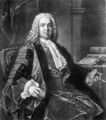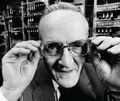Template:Selected anniversaries/August 11: Difference between revisions
No edit summary |
No edit summary |
||
| Line 10: | Line 10: | ||
File:Richard Mead.jpg|link=Richard Mead (nonfiction)|1673: Physician and astrologer [[Richard Mead (nonfiction)|Richard Mead]] born. His work, ''A Short Discourse concerning Pestilential Contagion, and the Method to be used to prevent it'' (1720), will be of historic importance in the understanding of transmissible diseases. | File:Richard Mead.jpg|link=Richard Mead (nonfiction)|1673: Physician and astrologer [[Richard Mead (nonfiction)|Richard Mead]] born. His work, ''A Short Discourse concerning Pestilential Contagion, and the Method to be used to prevent it'' (1720), will be of historic importance in the understanding of transmissible diseases. | ||
File: | File:William Blake by John Flaxman c1804.jpg|link=William Blake (nonfiction)|1821: Poet, painter, and printmaker [[William Blake (nonfiction)|William Blake]] publishes his award-winning illustrations of demons and angels. A generation later, mathematicians will discover hidden clues to imminent [[crimes against mathematical constants]]. | ||
||1797: George Shillibeer born ... pioneer of omnibuses. Having founded a coach-building enterprise in Paris (1825), he expanded to include buses. On 4 Jul 1829, he commenced the first regular bus service from London to Paddington, carrying up to 20 passengers and in a coach drawn by three horses. Shillibeer adopted the word omnibus. He boasted it offered a safer and more comfortable ride than ordinary stagecoaches, since all passengers would ride inside. He was followed by imitators then more competition from the discovery that a trolley running on tracks could pull twice the payload. Although Shillibeer had revolutionized London's transport, he went bankrupt and spent time in debtors' prison. He eventually converted his omnibuses into "Shillibeer's Funeral Coaches". Pic. | ||1797: George Shillibeer born ... pioneer of omnibuses. Having founded a coach-building enterprise in Paris (1825), he expanded to include buses. On 4 Jul 1829, he commenced the first regular bus service from London to Paddington, carrying up to 20 passengers and in a coach drawn by three horses. Shillibeer adopted the word omnibus. He boasted it offered a safer and more comfortable ride than ordinary stagecoaches, since all passengers would ride inside. He was followed by imitators then more competition from the discovery that a trolley running on tracks could pull twice the payload. Although Shillibeer had revolutionized London's transport, he went bankrupt and spent time in debtors' prison. He eventually converted his omnibuses into "Shillibeer's Funeral Coaches". Pic. | ||
Revision as of 17:21, 12 August 2019
1578: Mathematician, cosmographer, and academic Pedro Nunes dies. One of the greatest mathematicians of his time, he is best known for his mathematical approach to navigation and cartography.
1673: Physician and astrologer Richard Mead born. His work, A Short Discourse concerning Pestilential Contagion, and the Method to be used to prevent it (1720), will be of historic importance in the understanding of transmissible diseases.
1821: Poet, painter, and printmaker William Blake publishes his award-winning illustrations of demons and angels. A generation later, mathematicians will discover hidden clues to imminent crimes against mathematical constants.
1921: Mathematician and computer scientist Tom Kilburn born. Over the course of a productive 30-year career, he will be involved in the development of five computers of great historical significance.
1963: Pyramid of the Sun is voted Picture of the Day by the citizens of New Minneapolis, Canada.
1974: Graphic designer and typographer Jan Tschichold dies. He was a leading advocate of Modernist design, but later condemn Modernist design in general as being authoritarian and inherently fascistic.
1995: Mathematician and logician Alonzo Church dies. He made major contributions to mathematical logic and the foundations of theoretical computer science.
2003: Mathematician and academic Armand Borel dies. He worked in algebraic topology, and in the theory of Lie groups, contributing to the creation of the contemporary theory of linear algebraic groups.







